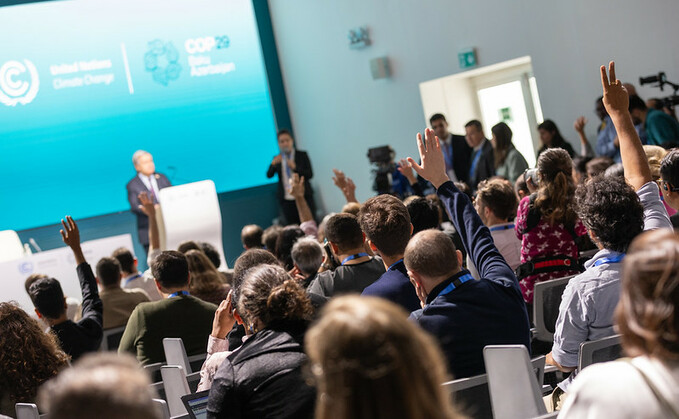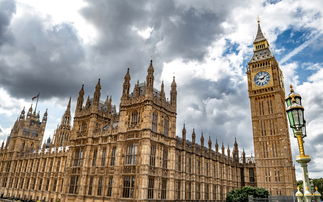
Credit: UNclimatechange @ Flickr
Governments will have to recognise eventually that flows of climate finance have to increase and the transition away from fossil fuels is inevitable - it is in their interests to do it now, rather than later
One of the big problems, and one of the big strengths, of COP Summits is the way they draw everyone into the fine print complexity of tackling the climate crisis. The past two weeks have seen countries tussle over 'NCQGs' and 'quantums', 'provision' and 'mobilisation' goals, 'paragraph 28' and 'rule 16', and even how to define 'gender'.
All these issues are hugely important, but they do risk distracting participants in the talks from what they are trying to achieve and why it matters. Every speaker on the main platform references the depth of the climate crisis, the beauty of the living world, and the civilisation-defining nature of the task at hand, before then returning to sterile negotiating rooms and tasteless coffee to thrash out the most soul-crushing of legalese.
With the talks seemingly stuck in the deadlocked position that has defined most of the second week of the Summit, UN Secretary-General Antonio Guterres yesterday made an ebullient attempt to get negotiators to consider the bigger picture. "Never forget what is at stake," he said. "This is a COP to deliver justice in the face of climate catastrophe. To help move us closer to securing a decent world for all humanity."
This context is important on two fronts: one deeply depressing, the other genuinely inspiring.
The first is that the climate does not care what people say. It is only impacted by what they do. As Guterres pointedly observed when asked about the attempt by some nations to block any mention of 'fossil fuels' in the final text, this linguistic game does not change any hard physical truths. "There are areas of language and there are areas of reality," he said. "For me it is clear, science stresses there will be no way to reach 1.5C as a limit to global warming if there is not a phase out of fossil fuels - a phase out of fossil fuels in the context of a just transition. Whatever language is adopted will not change this reality."
A text that attempts to deny, conceal, or ignore that reality will not change it. Failing to name the problem or hiding it inside layers of legalistic sophistry will not make it go away. It'll almost certainly make it worse.
In this context, climate finance is not an act of charity, but an essential mechanism for ensuring the whole world can reach net zero before global temperatures spiral out of control. As Guterres observed, "climate finance is not a handout... its a down payment on a safer future".
The second and more encouraging part of the big picture is that the macro trends the COP process is attempting to steer will continue to move in the right direction regardless of the granular detail of any final text.
It would be helpful if governments collectively reiterated their pledge to transition away from fossil fuels in energy systems, especially when they agreed it less than 12 months ago. But as think tank Ember highlighted this week, around half of countries are already past the peak for energy-related fossil fuel use. Their clean energy transitions will continue and more countries will join them, attracted by the cost competitiveness of renewables and the recognition it is in their interests to decarbonise. Just this week, Indonesia announced it intended to phase out coal and gas power by 2040.
Equally, a new climate finance package is urgently required, but it is also inevitable that trillions of dollars are set to flow into decarbonisation and climate resilience projects in developing economies over the next few decades. As the International Energy Agency has painstakingly documented, clean energy is becoming the default for new infrastructure projects in many parts of the world. This trend could be about to receive a further boost if the Trump administration makes good on its threat to jack up tariffs, forcing China to seek alternative markets for its expanding solar and electric vehicle factories.
None of this is to suggest the negotiations in Baku do not matter. Nowhere in the world is the transition happening fast enough. There are both opportunities and injustices that can only be addressed through international co-operation. The sheer complexity of the global net zero transition means the diplomatic and legal framework for achieving it will always be complicated. The detailed plan for ratcheting up flows of climate finance and the explicit commitment to transitioning away from fossil fuels that exhausted negotiators in Baku are trying to deliver would make it easier to mobilise clean tech investments and drive down emissions. Their continued absence makes it harder.
This is one of the reasons the COP29 Presidency's decision not to provide a cover text for the Baku Summit is so disappointing. As without an overarching summary of the deal the clear signal to governments, media, business leaders, and investors that the global net zero transition is accelerating and irreversible will be dampened. A collection of 12 different negotiating texts may yet deliver an historic, world-shaping new accord, but then suffocate that message in reams of impenetrable language.
The texts diplomats will be sweating over today are hugely important. The handful of countries seeking to block an ambitious compromise deal are working to make the world a harder and more dangerous place for everyone, themselves included. The hope is that everyone remembers the big picture of global clean energy and climatic macrotrends. What they tell us is you might as well go for an ambitious deal now, because that is where you will have to end up eventually.
A version of this article first appeared as part of BusinessGreen's Overnight Briefing email, which is available to all BusinessGreen Intelligence members.









